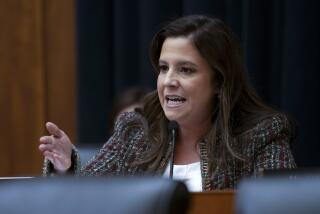Credentialing the Adversary
- Share via
On June 28, the State Department confirmed a report that the U.S. ambassador to Tunisia, who since last December has been talking with representatives of the Palestine Liberation Organization, had recently upgraded the sessions by meeting with Salah Khalaf, the PLO’s No. 2 man. That same day, as it happened, Khalaf was indicted in Italy for supplying guns in the 1970s to the Red Brigade, the terrorist band whose crimes include murdering former Prime Minister Aldo Moro and kidnaping U.S. Army Gen. James Dozier.
Khalaf’s links with terrorism are much more direct than alleged gun-running, however. Better known by his code name Abu Iyad, he was a founder of Black September, which among other things was responsible for the massacre of 11 Israelis at the 1972 Munich Olympic Games and the murder in 1973 of Cleo A. Noel Jr., the U.S. ambassador to Sudan. That Khalaf has a lot of blood on his hands is clear. It was no less clear that once word leaked that he was negotiating for the PLO with the United States, Congress would react with anger and disgust.
Congressional ire was manifested in a proposed amendment that would have halted the U.S.-PLO talks unless the President could certify that the PLO representatives had no ties to terrorist activities in which Americans were killed, injured or kidnaped. Adoption of this measure would have eliminated Khalaf as an active interlocutor. It also would have provoked another of those bitter constitutional controversies over Congress’ proper role in foreign policy; in this case, whether it can tell a President whom he may negotiate with. In the end, strong lobbying by the Bush Administration led to a compromise that calls for halting the PLO talks only if the President knows and chooses to advise Congress that one of the PLO negotiators was a direct participant in terrorism.
The leeway allowed in this approach is marginally preferable, but the implicit restraint is still far from diplomatically attractive. For the ancient and harsh truth remains that in the conduct of foreign affairs, governments aren’t free to choose their negotiating partners. If moral acceptability were the required test, U.S. diplomatic contacts with much of the world would come to a halt.
Khalaf, as it happens, was publicly identified by the State Department last November as a major terrorist. Did the PLO thus put him at the table in Tunis in a deliberate effort to embarrass the United States? Perhaps. The Administration’s assessment, nonetheless, is that, like it or not, the PLO should be talked to because it remains an important player in efforts to resolve the Middle East conflict. If the PLO is serious about participating in that effort and not just interested in more devious propaganda games, it will make sure that its next representative to the Tunis talks is someone whose reputation was not made by planning cold-blooded murders.
More to Read
Sign up for Essential California
The most important California stories and recommendations in your inbox every morning.
You may occasionally receive promotional content from the Los Angeles Times.













